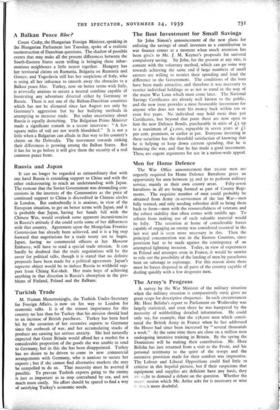A Balkan Peace Bloc?
Count Csaky, the Hungarian Foreign Minister, speaking in the Hungarian Parliament last Tuesday, spoke of a realistic reconstruction of Danubian questions. The shadow of possible events that may make all the present differences between the South-Eastern States seem trifling is bringing these inhar- monious neighbours a little nearer together. Hungary has her territorial claims on Rumania, Bulgaria on Rumania and Greece, and Yugoslavia still has her suspicions of Italy, who is using all her influence to smooth away the obstacles to a Balkan peace bloc. Turkey, now on better terms with Italy, is avowedly anxious to secure a neutral combine capable of frustrating any adventure directed either by Germany or Russia. There is not one of the Balkan-Danubian countries which has not be alienated since last August not only by Germany's aggression but by her bullying methods in attempting to increase trade. But today uncertainty about Russia is equally disturbing. The Bulgarian Prime Minister made a significant remark in a recent interview: " A few square miles of soil are not worth bloodshed." It is not a little when a Bulgarian can allude in that way to his country's claims on the Dobrudja. The movement towards sinking their differences is growing among the Balkan States. But it has far to go before it will give them the security of a real common peace front.




































 Previous page
Previous page